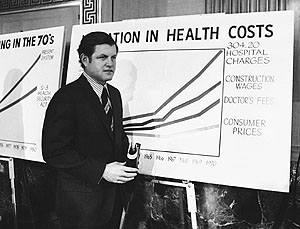 Matt Yglesias misses Ted Kennedy’s presence in the healthcare reform debate:
Matt Yglesias misses Ted Kennedy’s presence in the healthcare reform debate:
I’m confident that were he still alive, he’d be saying what Sherrod Brown and Jay Rockefeller are saying — namely that when a deal like this is on the table, you say yes, pretend to like Joe Lieberman, get the thing done, do some good for the American people, and move on to other priorities. But he’s not alive. And I can’t prove that’s what he’d say. So we’re left instead with other folks like Brown and Rockefeller or just don’t have the same high profile or credibility needed to help sell people on this arrangement.
One of Kennedy’s great regrets in life was not figuring out a way to cut a deal with Richard Nixon over his proposal to provide universal healthcare in 1971. He changed his mind in 1973 and came close to reaching agreement with Nixon, but by then AMA opposition combined with the distraction of Watergate took it off the table, not to return for another two decades. Steven Pearlstein provides a capsule summary here.
So you really hardly have to guess here. Kennedy had vivid personal memories of rejecting a healthcare deal because it wasn’t good enough, and then watching the moment pass and having reform die utterly. If he were alive today, there’s no question that he’d be fighting to pass the current bill, warts and all.
UPDATE: Greg Sargent provides a different take from Kennedy historian Adam Clymer:
Rather, Clymer says, Kennedy’s regret was that the differences between both parties were unbridgeable, making agreement impossible and losing a historic opportunity — not that his side had failed to give up enough to get that agreement.
“Kennedy was sorry that they didn’t reach an agreement” and that both sides “never reached closure,” Clymer told our reporter, Amanda Erickson. He dismissed the idea that Kennedy regretted not giving up enough: “That’s not the same thing at all.”
Duly noted, though this is actually a fairly nuanced difference of interpretation. In any case, the differences Kennedy had with Nixon were far greater than the gaps we’re trying to bridge today. I don’t think there’s any doubt he would have supported the current deal.















